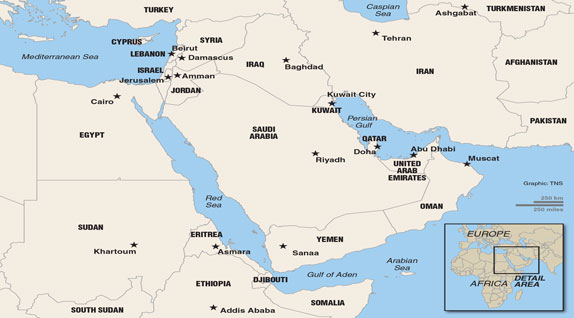 TNS
TNS
Article
Learn the why behind the headlines.
Subscribe to the Real Truth for FREE news and analysis.
Subscribe NowUnrest is occurring throughout the Middle East. Its nations’ borders are changing as people of different ethnic and religious identities fight for control of the area. Other countries are entangled in proxy and political wars. What follows is a brief profile of some Middle Eastern nations that are facing such issues.
Saudi Arabia
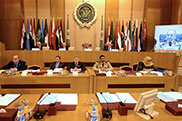 Mohamed El-Shahed/AFP/Getty Images
Mohamed El-Shahed/AFP/Getty ImagesThe nation launched a military operation after Yemeni president Abd-Rabbu Mansour Hadi was ousted by Iran-backed Houthi rebels. Saudi jets conducted airstrikes on the area while troops gathered on the border to prepare for a ground invasion.
The New York Times reported: “Fueling these interventions is a prevailing sense among Saudi leaders that the United States, its longtime ally and security guarantor, has withdrawn from the region, leaving a vacuum that Iran has exploited. The Obama administration’s focus on reaching a deal with Iran on its nuclear program has only increased this sense of neglect, Saudis say.”
The bombings have sparked tensions with Iran, which has considered retaliating against Saudi Arabia.
Iraq
Iraq’s borders continue to fluctuate as ISIS, an extremist Sunni group, battles with the Shia-led Iraqi government for territory.
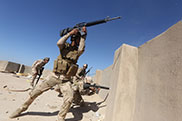 Ahmad Al-Rubaye/AFP/Getty Images
Ahmad Al-Rubaye/AFP/Getty ImagesIn April, tens of thousands of Iraqis fled Anbar province after ISIS captured its capital, Ramadi. Despite Iraq’s attempts to take the province, Islamic militants still control most of the region. Yet the Iraqi government is hesitant to provide weapons to the large number of Shiite citizens there, fearing this might alienate Sunnis, who could then sympathize with and join ISIS.
The April offensive contradicted the notion that ISIS had been weakened to the point it could not continue making territorial gains.
Iran
The Islamic Republic agreed to reduce the number of centrifuges at nuclear facilities, cut back on its stockpile of enriched uranium, and convert one of its reactors into a research facility in a framework created to halt its nuclear program. In exchange, crippling economic sanctions imposed by the United States on Iran will be dropped.
Meanwhile, Iran continued engaging in proxy wars throughout the Middle East, seeking to undermine areas of American influence. Although prohibited by international law, Iran has shipped weapons and military trainers to Houthi fighters in Yemen.
Syria
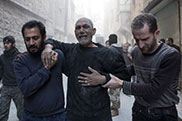 Karam Al-Masri/AFP/Getty Images
Karam Al-Masri/AFP/Getty ImagesSyrian anti-government rebels have been fighting against ISIS militants and Bashir al-Assad’s regime. The Islamic State cut off trade routes to contain the rebel forces, while the Syrian government conducted airstrikes on the rebels in response to their shelling of government-owned cities.
The civil war has put civilians in peril. UNICEF estimates that 14 million civilians have been affected, with 6.5 million internally displaced and 3 million having fled to neighboring countries such as Lebanon, Jordan and Turkey.
Yemen
The Houthis, an extremist, anti-West faction of Shia Islam, have gained control of large portions of Yemen since 2014. In September 2014, Houthi fighters captured the capital, Sanaa, forcing President Abd-Rabbu Mansour Hadi to flee to Saudi Arabia. Threatened by the advance of the group near their border, Saudis began bombing Houthi-controlled areas in March 2015, killing over 1,000 by the end of April.
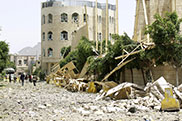 Mohammed Huwais/AFP/Getty Images
Mohammed Huwais/AFP/Getty ImagesThe rebel group is stopping truck convoys from entering government-controlled areas in Yemen, the poorest country in the Middle East, while Saudi naval patrols are checking ships for weapons. The blockades have stopped necessary food aid from arriving to a country in which half of its population is on the verge of starvation, according to the United Nations.
Afghanistan
Taliban militants launched a major offensive against Afghan security forces in April near Kunduz, a major city in the northern part of the country, in an effort to overthrow the government.
ISIS militants have also established a presence in the nation. Early in the year, the group bombed several urban areas in Afghanistan, killing dozens of civilians.
Lebanon
Lebanon has the highest concentration of refugees per citizen in the world—one in every four—most of whom escaped violence in Syria. The influx of Syrian refugees has strained Lebanon’s resources, scared tourists from visiting, and reduced the number of available jobs for citizens.
Various political factions inside the nation, which has not had a president or main leader since May 2014, are struggling to come to terms with how to run the country amid the refugee crisis. The majority of Lebanon’s parliament, including members of the Iran-backed Hezbollah party, refuse to attend the sessions necessary to select a presidential candidate, despite urging from the UN to conduct them.
More on Related Topics:
- Iran Commemorates 1979 Revolution as Nation Is Squeezed by Anger Over Crackdown and Tensions with U.S.
- The Gaza Ceasefire Began Months Ago. Why Does Fighting Persist?
- Activists Say Iran’s Crackdown Has Killed at Least 6,221 People, as the Country’s Currency Plunges
- Explainer: What Is the Status of Iran’s Main Nuclear Facilities?
- Iran Signals Plans for Fast Trials and Executions While Promising ‘Decisive Response’ to U.S., Israel


